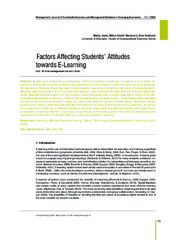Please use this identifier to cite or link to this item:
https://rfos.fon.bg.ac.rs/handle/123456789/1718Full metadata record
| DC Field | Value | Language |
|---|---|---|
| dc.creator | Jović, Marija | |
| dc.creator | Kostić-Stanković, Milica | |
| dc.creator | Nešković, Ema | |
| dc.date.accessioned | 2023-05-12T11:10:41Z | - |
| dc.date.available | 2023-05-12T11:10:41Z | - |
| dc.date.issued | 2017 | |
| dc.identifier.issn | 1820-0222 | |
| dc.identifier.uri | https://rfos.fon.bg.ac.rs/handle/123456789/1718 | - |
| dc.description.abstract | E-learning is becoming a widespread method of gaining knowledge in a global environment. Accessibility and variety of online content encourage more and more people to get involved in learning using digital resources. However, there has been limited research exploring the factors that could influence students’ attitudes regarding e-learning. In this study, field research was conducted to determine which factors affect students’ attitudes towards e-learning. The questionnaire was developed to collect data about factors that influence attitudes towards e-learning. A total of 286 students were the study cohort. Three factors were identified using principal component analysis: e-learning usefulness, ease of use, and content design. Regression analysis was conducted to determine the strength of the factors influencing attitudes towards e-learning. All factors had a significant influence on attitude towards e-learning. Usefulness of e-learning had the strongest impact on students’ e-learning intention. Our study will contribute to the existing work in this field by emphasizing the importance of perception of content design on attitudes towards e-learning. | en |
| dc.publisher | Univerzitet u Beogradu - Fakultet organizacionih nauka, Beograd | |
| dc.rights | openAccess | |
| dc.rights.uri | https://creativecommons.org/licenses/by-nc-nd/4.0/ | |
| dc.source | Management: Journal of Sustainable Business and Management Solutions in Emerging Economies | |
| dc.subject | technology acceptance model | en |
| dc.subject | factors | en |
| dc.subject | e-learning | en |
| dc.subject | e-learning content design | en |
| dc.subject | attitudes towards e-leaning | en |
| dc.title | Factors affecting students’ attitudes towards e-learning | en |
| dc.type | article | |
| dc.rights.license | BY-NC-ND | |
| dc.citation.epage | 80 | |
| dc.citation.issue | 2 | |
| dc.citation.other | 22(2): 73-80 | |
| dc.citation.rank | M24 | |
| dc.citation.spage | 73 | |
| dc.citation.volume | 22 | |
| dc.identifier.doi | 10.7595/management.fon.2017.0016 | |
| dc.identifier.fulltext | http://prototype2.rcub.bg.ac.rs/bitstream/id/424/1714.pdf | |
| dc.identifier.rcub | conv_832 | |
| dc.type.version | publishedVersion | |
| item.cerifentitytype | Publications | - |
| item.fulltext | With Fulltext | - |
| item.grantfulltext | open | - |
| item.openairecristype | http://purl.org/coar/resource_type/c_18cf | - |
| item.openairetype | article | - |
| Appears in Collections: | Radovi istraživača / Researchers’ publications | |
Page view(s)
12
checked on Dec 28, 2025
Download(s)
4
checked on Dec 28, 2025
Google ScholarTM
Check
Altmetric
This item is licensed under a Creative Commons License


